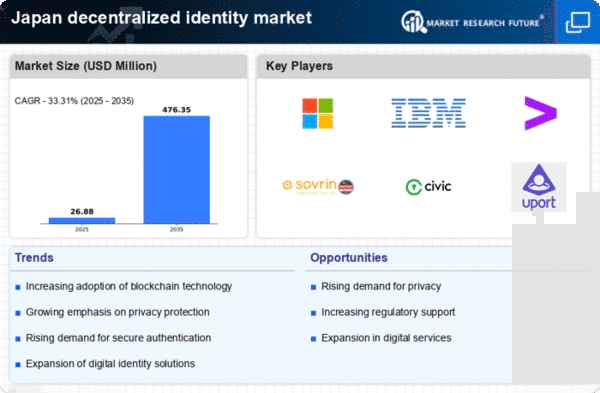Growing Awareness of Privacy Concerns
As awareness of privacy issues continues to rise among Japanese consumers, the decentralized identity market is likely to experience significant growth. Individuals are becoming increasingly concerned about how their personal data is collected, stored, and used by various entities. This shift in consumer sentiment is driving demand for decentralized identity solutions that prioritize user privacy and data ownership. In 2025, surveys indicate that approximately 70% of Japanese consumers express concerns about data privacy, highlighting the need for solutions that empower users to control their identities. The decentralized identity market is well-positioned to address these concerns, offering technologies that enable individuals to manage their personal information securely and transparently, thereby fostering trust in digital interactions.
Rising Demand for Secure Digital Transactions
The increasing reliance on digital transactions in Japan has led to a heightened demand for secure identity verification methods. As e-commerce and online services proliferate, the decentralized identity market is positioned to address concerns regarding data breaches and identity theft. In 2025, it is estimated that online retail sales in Japan will reach approximately ¥20 trillion, underscoring the necessity for robust identity solutions. The decentralized identity market offers innovative approaches to secure transactions, enabling users to authenticate their identities without compromising personal information. This shift towards secure digital transactions is likely to drive growth in the decentralized identity market, as businesses and consumers alike seek reliable methods to protect their identities in an increasingly digital economy.
Government Initiatives for Digital Transformation
The Japanese government has been actively promoting digital transformation initiatives, which significantly impact the decentralized identity market. With the aim of enhancing public services and improving efficiency, the government has introduced various policies to encourage the adoption of digital identity solutions. For instance, the Digital Agency of Japan has been established to oversee the implementation of digital technologies across sectors. This governmental support is expected to catalyze the growth of the decentralized identity market, as public institutions and private enterprises collaborate to develop and deploy innovative identity management solutions. The potential for government-backed projects could lead to increased investment and development in the decentralized identity market, fostering a more secure and efficient digital ecosystem.
Increased Collaboration Among Industry Stakeholders
The decentralized identity market in Japan is witnessing increased collaboration among various stakeholders, including technology providers, financial institutions, and government agencies. This collaborative approach is essential for developing comprehensive identity solutions that meet the diverse needs of users. Partnerships between private and public sectors are likely to enhance the capabilities of the decentralized identity market, fostering innovation and driving adoption. In 2025, it is anticipated that collaborative projects will lead to the launch of new identity management platforms, further expanding the market. This trend towards collaboration not only strengthens the ecosystem but also encourages the sharing of best practices and resources, ultimately contributing to the growth and maturity of the decentralized identity market.
Technological Advancements in Identity Verification
Technological advancements are playing a crucial role in shaping the decentralized identity market in Japan. Innovations such as biometrics, artificial intelligence, and blockchain technology are enhancing the capabilities of identity verification systems. These advancements enable more secure and efficient methods for verifying identities, which is essential in a rapidly evolving digital landscape. In 2025, it is projected that the market for biometric authentication in Japan will exceed ¥100 billion, reflecting the growing reliance on advanced technologies for identity management. The decentralized identity market stands to benefit from these technological developments, as they facilitate the creation of more robust and user-friendly identity solutions that can adapt to the changing needs of consumers and businesses alike.
















